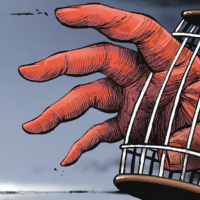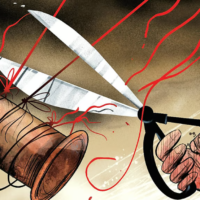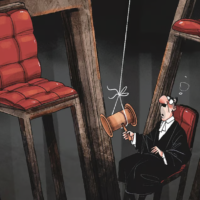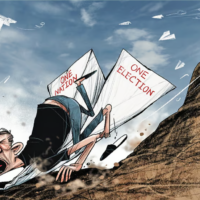The war against the novel coronavirus has to be fought on two battlefronts. Generals know that is always a tough call. You require enough supplies to last till the war is won. Quality manpower, modern equipment and access to the latest technology provides the recipe to success. Generals also need to manage the war’s consequences.
So far in this battle, we have failed to put our best foot forward. The front that requires immediate attention is to equip our doctors with quality personal protective equipment (PPE). Very few have it. A couple of days ago, four contract doctors at Hindu Rao hospital in Delhi resigned. Despite frequent requests, they were not provided with PPE.
Another disturbing fact is that at least eight doctors in Delhi, because of their exposure, are now carrying the virus. Without PPE, this battle has not even begun to be fought. Though the World Health Organisation had declared COVID-19 to be a global pandemic as early as late January, the government did not take timely action. That it took two months to order the procurement of PPE is an act of gross negligence. I wonder if anyone will be penalised for callous inaction considering that in January itself, the government was aware of the lethal effects of this virus.
It was only on March 24, the day the national lockdown was announced, that the textile ministry ordered the procurement of 26 lakh units of PPE. From the 14 companies selected, some of whom have no prior experience, only 60,000 units have been procured so far. The combined manufacturing capacity of these units is only 15,000 a day. At this rate, the required need will be met only in six months.
The second requirement is to procure testing kits. Without data, available only upon testing, we cannot strategise our future course of action. It is not yet known when and how high-quality testing kits will be made available. The third requirement is to isolate wards and beds in hospitals and convert enclosed public spaces into isolation wards. Presently we do not have the requisite infrastructure to meet our needs. If the pandemic spreads we will be caught napping.
The other front on which the war is to be fought relates to managing the economic consequences of the lockdown. The real stakeholders are the less privileged millions who need work to survive. This includes daily wagers, many of whom are migrant labour, along with others who have lost their jobs because of the economic downturn. Maruti car sales dropped 47% in March. Factories have shut down causing distress for those laid off. The informal sector is the hardest hit.
The state must immediately announce a financial package for their survival. The exodus of migrant labour has affected essential supplies required by households. The wholesale market in Khari Baoli, Delhi cannot function without labour moving stocks in bags from godowns, in carts, to wholesalers for retail supplies. The biggest wholesale market in Delhi is selling essentials already stocked with them from their godowns. These will last for a few more days and then dry out. Without labour to move wholesalers’ existing stocks from godowns, the shelves in retail shops will soon be empty.
The wholesalers deal in wheat flour, pulses, spices etc. which are essential for consumption in households. With the drying out of the supply chain, these essential commodities will not reach consumers. Market manipulation will leave our poor stranded without food. The rich will still survive. This scenario is replicated across the country and needs immediate attention.
Given the inability to move stocks physically from wholesalers to retailers, online platforms are witnessing an unprecedented surge in orders. Amazon and Flipkart’s business prospects seem rosy. Unfortunately, they too are handicapped. To honour orders, transportation is required to reach essential supplies to consumers. Truck drivers have abandoned vehicles in fear. With supply chains being disrupted, it will be difficult to deliver essential goods to consumers.
The government’s announcement of allowing both essential and non-essential items to be transported is welcome but it has not had much effect on the ground. In these circumstances, the requirement of E-way bills is proving to be an impediment in providing essential services. Law requires an E-way bill to transport goods above Rs 50,000 in value. Since drivers are not available, requirement of including the vehicle number in the E-way bill cannot be complied with. This impacts the movement of essential supplies across the country.
The state of finances in the country is equally grim. With shut down of businesses, revenue earnings will be far below projections in the Finance Bill. Disinvestment targets will not be met. There will be no buyer for Air India. GST revenues are also far below expectation. The government has, therefore, limited financial resources to meet the immediate requirements of the poor and the marginalised. The targeted financial package of Rs 1.70 lakh crore is far too meagre and fails to deal with the concerns of others left out. The Reserve Bank of India has taken steps to providing banks with greater leverage in offering credit. Business being almost at standstill, credit off-take will be minimal.
This war on two fronts requires institutional cooperation at all levels. The Union and the states must work in tandem and seek the cooperation of NGOs and other stakeholder networks. Courts must act as constitutional sentinels asking questions that need to be asked; seeking the government’s accountability if it inadequately addresses issues of the moment. A government which chose to impose the lockdown without even informing the people, let alone consulting state governments, needs to introspect. Gone are the diktats of Mughal emperors. No democratic government can function without collaboration. It is time to shun politics; not to give this pandemic a communal colour.
Let us salute the warriors who are fighting this battle – medical practitioners, the police force cautioning people and our foot soldier journalists, who all carry the risk of being infected. In this battle, the Generals, responsible for governance must be seen on the frontlines. They must address our concerns and for once answer our questions.










